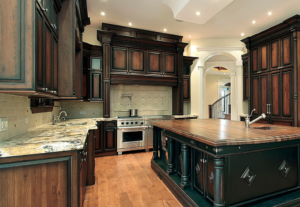
With the abundance of quartz countertop brands in the marketplace, it can be difficult to know which ones are actually rated any higher or lower than others and whether the brand aspect of quartz even matters. As most quartz materials are identified by their brand name rather than just a color name, a little research into general quartz specifics will give an overall picture of what to expect. Knowing the differences with quartz countertop brands does have some importance simply in determining what quartz choice works best with a particular situation. So what differences should a consumer examine with quartz brands?
Quartz Brands in General
Generally, quartz is going to have similar characteristics. Technologically and historically speaking, quartz production is derived through Bretonstone technology, which is a patented system developed some 50 years ago by Marcello Toncelli. The system process and the machines used in production are licensed throughout the world, so other quartz manufacturers today continue to utilize the patent.
Quartz Brands Similarities
1. Quartz is going to have a similar mineral content of a little over 90 percent. The minerals are what provide quartz with its characteristic appearance and feel.
2. Hardness is attributed to quartz because of its mineral composition and elimination of other impurities.
3. The low porosity rate of quartz sets it apart from other materials and makes it a nonabsorbent material, which resists water absorption and creates a hard and durable surface.
4. Heat resistance with quartz is only good up to certain temperatures (360 degrees Fahrenheit) for a short duration of time. The minerals can stand the heat but the other materials and resin within quartz are what can trigger heat damage.
5. Any seaming that occurs with quartz will likely be visible. Usually, more than one slab has to used with a quartz countertop installations so any seam is going to show unless the installer is extremely adept at diminishing it.
Quartz Brands Differences
1. Designs and edging with quartz brands are two of the biggest differences with brands. Actual designs have to do with the appearance of a quartz slab along with its size, shape, mineral composition, color, and any textural aspects within the slab. The edging aspect has to do with the actual contours or profiles that are formed at the time of production in a factory.
2. Most quartz brands either come with warranties or different warranties are available. The differences in warranties deal with any limitations as well as with the time period of the warranty and whether the warranty can be transferred.
3. Prices are going to vary between quartz brands. The slabs themselves are usually priced at wholesale and are limited to the availability with the manufacturer and validated dealers and installers. Quartz prices through dealers are usually negotiable and can vary.
4. Color differences are going to occur with quartz brands as are color ranges within brands. Some brands will have minimal color selections while others will have innumerable choices.
Quartz Brand Specializations
Certain quartz brands do have distinctive characteristics within the brand. Top-of-the-line brands include the following specializations:
- Cambria – is the largest manufacturer of quartz and is well known for its striking and lively designs that are interspersed with large luminous mineral clusters.
- Silestone – provides different quartz textures through suede and polished categories as well as Volcano.
- Caesarstone – focuses on one-color or monochromatic looks with pure white and even concrete inspired designs.
Whether you are comparing quartz brand names or are simply looking for a quartz slab that meets your color and size specifications, complete the online form and a quartz expert will get back to you with the information you need to make an informed decision concerning your countertop needs.






